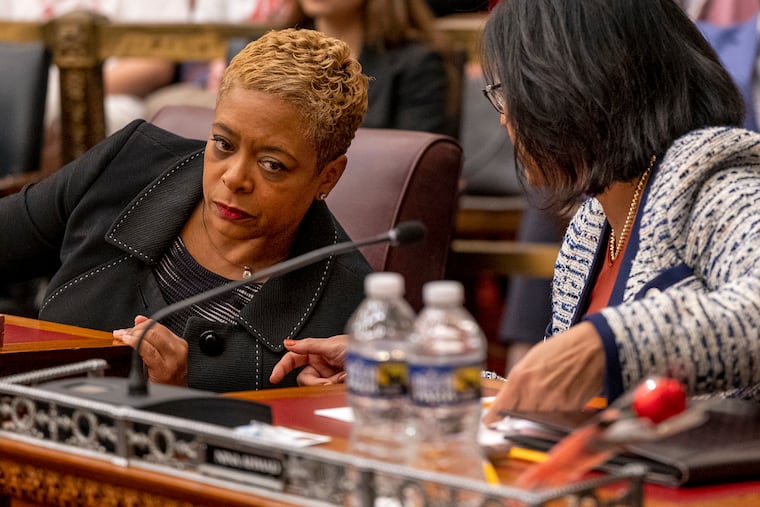Community organizations could be subject to tighter rules under proposed legislation — but only in part of the city
The legislation, proposed by Council member Cindy Bass, has stirred controversy among Philadelphia's Registered Community Organizations.

Councilmember Cindy Bass wants to ensure that the leadership of the city’s registered community organizations (RCOs) — officially recognized neighborhood groups that weigh in on zoning matters — live in the areas they represent.
“We think it’s important that the people who live in a community have the ultimate say about what’s going to happen,” Bass said at a City Council Rules Committee hearing Tuesday morning. “I firmly believe that someone in Northeast Philly shouldn’t have a say about something that’s happening in Germantown, and somebody in Germantown shouldn’t be telling Northeast Philly what to do.”
But Bass’ seemingly straightforward objectives have stirred controversy. As it currently stands, the legislation would apply to organizations in only two council districts: Bass’ 8th in the Northwest and Anthony Phillips’ 9th in far North Philadelphia.
That’s because Bass was unable to convince the eight other district Council members to sign on to her legislation, so a citywide change to RCO rules is out. Instead, she is advancing it under the tradition of councilmanic prerogative, which means all, or most, of Council will vote to approve legislation introduced by a particular member if it applies only to that member’s district.
Councilmanic prerogative has already resulted in a patchwork of different zoning rules for Council districts and neighborhoods across the city. This is the first effort to tweak RCO regulations under that structure.
Other Council members say part of the reason they have not signed on to Bass’ effort is that, in some neighborhoods, particularly in low-income areas, former community residents lead RCOs, and if they were disqualified from participating, there may not be people to replace them. In other areas, property owners may sit on local RCO boards but don’t actually live in the neighborhood themselves. There have also been cases of non-Philadelphia residents involving themselves in RCO boards to advance the interests of a particular organization or business.
At the February Planning Commission meeting, all of the public testimony opposed the legislation.
“I’m active in several RCOs in the city, and I’m really questioning why we even came up with this because, you know, the city’s done away with residency requirements for police officers,” said Jihad Ali, a community advocate who has long weighed in on zoning matters. “To put this requirement on, I don’t think is appropriate.”
Tweaking the proposal
The Planning Commission staff presented myriad other issues with the legislation, noting that 55 RCOs encompass territory partly in one of the affected districts and partly in districts of Council members that have decided not to opt in. They also noted that the city does not ask for the addresses of RCO members — with the exception of one point person — so enforcing the rules could be a challenge.
Planning staff also noted that the change comes in the midst of the two-year terms for RCOs, which would be unfair to groups approved under the existing rules.
Critics noted that leadership looks substantially different across the various organizations with RCO status, including political wards, community development corporations, long-standing neighborhood groups, and single-member organizations with no real constituency.
After hearing concerns from staffers about the lack of definition for “RCO leadership” in her bill, Bass amended the proposal at the hearing to define RCO leadership to include “board members, associating committee members, conveners, those that may function as decision makers, and/or anyone acting in an official capacity representing an RCO.”
The Planning Commission asked for a 45-day hold on the bill before it is passed, so staff can study it further and suggest tweaks.
More RCO reform ahead?
Former City Council President Darrell L. Clarke said he had hoped that this year’s Council would rationalize RCO rules to clear up overlapping boundaries, clarify what organizations can become RCOs, and screen for bad actors. (In other cities, such as New York and Washington, community groups with influence over zoning have a more clearly defined role and have municipally monitored elections and sharper regulations.)
The Building Industry Association (BIA), which represents residential developers, embraced Bass’s legislation as the prelude to more RCO changes.
“With investment leaving our city and a housing crisis consistently being spoken of, efforts like this helped make our city-imposed processes seem more fair,” said Rachael Pritzker, a zoning lawyer who is on the BIA board. “The BIA welcomes efforts like this and is hopeful that other changes to the development process and the RCO process will be looked at by this body.”